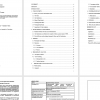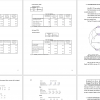Тема: THE MODERATING ROLE OF PRIVACY ON THE RELATION BETWEEN JOB STRESS AND JOB SATISFACTION WHEN WORKING FROM HOME AND WORKING FROM OFFICE: GENERATION Z CASE
Закажите новую по вашим требованиям
Представленный материал является образцом учебного исследования, примером структуры и содержания учебного исследования по заявленной теме. Размещён исключительно в информационных и ознакомительных целях.
Workspay.ru оказывает информационные услуги по сбору, обработке и структурированию материалов в соответствии с требованиями заказчика.
Размещение материала не означает публикацию произведения впервые и не предполагает передачу исключительных авторских прав третьим лицам.
Материал не предназначен для дословной сдачи в образовательные организации и требует самостоятельной переработки с соблюдением законодательства Российской Федерации об авторском праве и принципов академической добросовестности.
Авторские права на исходные материалы принадлежат их законным правообладателям. В случае возникновения вопросов, связанных с размещённым материалом, просим направить обращение через форму обратной связи.
📋 Содержание
ABSTRACT 6
INTRODUCTION 8
1. CORE CONCEPTS 11
1.1 Privacy as one of the basic human needs 11
1.2 Job Stress 13
1.3 Job Satisfaction 16
1.4 Hybrid Work Model 18
1.5 Working From Office 20
1.6 Working From Home 23
1.7 Generation Z at the workplace 24
2. DEVELOPMENT OF HYPOTHESES 26
2.1 Relation between Job Stress and Job Satisfaction 26
2.2 Job Satisfaction as a Predictor of a number of Days a person wants to WFH 27
2.3 Role of Privacy on the relation between Job Stress and Job Satisfaction 27
3. METHOD 29
3.1 Participants and design 29
3.2 Measures 30
3.2.1 Job stress 30
3.2.2 Job Satisfaction 31
3.2.3 Privacy 31
4. PRELIMINARY ANALYSIS 32
4.1. Descriptive statistics 32
4.2. Case Screening 33
4.2.1 Missing data in rows 33
4.2.2 Outliers detection 34
5. EXPLORATORY FACTOR ANALYSIS 34
5.1 Pattern matrix 34
5.2 Adequacy 37
5.3 Convergent validity 37
5.4 Discriminant validity 37
5.5. Reliability 37
6. CONFIRMATORY FACTOR ANALYSIS 40
7. TESTING HYPOTHESES 43
7.1. Path analysis 43
7.2 Moderation analysis 44
8. FINDINGS 51
9. LIMITATIONS AND DIRECTIONS FOR FUTURE RESEARCH 51
10. PRACTICAL IMPLICATIONS AND CONCLUSIONS 52
REFERENCE LIST 54
APPENDICES 59
Appendix 1 59
Questionnaire 59
Appendix 2 68
Personality type 68
Appendix 3 68
Types of the offices respondents work in 68
📖 Введение
As workers started to return to the offices after the pandemic was over, for many of them that felt like ‘coming back to reality’; their mental health and productivity suffered a lot (Galanti et. al., 2021).
Workers realized that their perception of the workplace and work itself changed; many of them started to ask for a hybrid work model, by which they can reduce stress. Companies themselves started to realize that more work can be successfully done remotely (Song, Lili, et al., 2020). As a result, the hybrid work model has become a new normal.
The Hybrid Work Model consists of two parts: Working From Office (WFO) and Working From Home (WFH). These parts are different in terms of work environment and resulting stress levels.
Work environment can be described as everything around the workers that can affect their job satisfaction in carrying out their work so that maximum work results will be obtained (Basalamah et al., 2021). Among work environment characteristics are temperature, humidity, ventilation, job facilities, lighting, noise, autonomy, etc.
Work environment at home is generally considered to be milder than at the office, which attributes to more autonomy, less noise, less distractions and more work-life balance (Sander, et al., 2021).
Work environment is one of the most important characteristics of work which is known for having relations with job stress and subsequent job satisfaction (Raziq, et. al., 2015).
Job stress is known to be one of the most important issues for the organization in terms of money losses: businesses in the US lose up to $300 billion dollars in a year due to loss in productivity caused by stress in the workplace, according to The American Institute of stress (AIS) (2011). Job stress is heavily tied with job satisfaction: they have negative relations with each other, which means that the more stress a worker feels, the less satisfied they are (Singh, et. al., 2019). Less satisfaction at the workplace leads to higher turnover rates (Ali Nazim, 2008). Furthermore, job stress leads to absenteeism among workers which in turn affects organizational performance.
Among those workers who value the work environment the most is Generation Z (people born between 1997 and 2012). For them, this is one of the top priorities when looking for a future job (Knoll, 2021). And it is also important for companies to take into consideration that Generation Z is more concerned with their Mental Health than other generations (Knapp C et.al., 2017).
Generation Z is entering the workplace and substituting Millennials as a workforce. For these reasons, companies need to ensure that the work environment is sufficient if they want to attract and retain Generation Z employees.
This research is focused on the work environment characteristics as a core component of Generation Z’s stress levels.
More specifically, the research is dealing with such work environment characteristic as Privacy which can be physical (being free from distractions, both physical and emotional) and mental (feeling emotionally safe and “alone” for the period of time necessary to recharge one’s battery).
Feeling physically and mentally safe is one of the most basic human needs based on Maslow's hierarchy of needs. Without this, it is impossible to claim self-esteem and selfactualization. In other words, if physical and mental privacy is lacking at the workplace, workers’ mental health and productivity will suffer a lot.
When a company fails to provide workers with privacy (for example, doesn’t have some quiet rooms or recreational areas in general) it may lead to workers’ burnout and resignation.
At the modern workplace privacy is often being overlooked and neglected because it is almost impossible to ensure it at the open space office design which is common to many companies. Moreover, switching to a whole remote work model is deemed impossible for many companies because the workplace provides opportunities for collaboration on important group tasks, and also a feeling of being a part of the group for workers which leads to less stress and more job satisfaction (Been et. al., 2014).
While Millennials generally opt for open office space, Generation Z values more privacy and the pandemic has only strengthened this feeling when Gen Zers understood all the advantages of remote working (Bohlich et. al., 2020).
All in all, privacy is essential for workers to be productive and psychologically safe, but not all the time they have an opportunity to experience it at the workplace. But the Hybrid Work Model, which was fostered by the pandemic, made it possible, when almost 90% of companies allowed their employees to work from home. WFO is associated with less Privacy in general and more stress (Flanagan, 2021), whereas WFH is associated with more Privacy and less stress (Siddiqi, 2021).
Our study examines Privacy as a moderator on the relation between job stress and job satisfaction. In other words, we seek to find out whether the absence of privacy leads to increased job stress and decreased job satisfaction; and the presence of privacy - to less stress and more job satisfaction in case of Generation Z employees.
...
✅ Заключение
We addressed the phenomenon of the Hybrid Work Model - the work model, which incorporates both WFH and WFO, thus creating a fluctuation between these two parts. This, in turn, creates a psychological response of workers that was rarely studied before and what was addressed in our study: how a perception of the work environment at the office creates an attitude toward WFH.
Our study suggests practical implications that may help managers to ensure mental health of workers and a company’s good performance as a result. When hiring workers of Generation Z, it is important to understand that they value Environmental Characteristics of the workplace and Privacy in particular.
There is no doubt that WFO is a crucial part of the work because going to the office allows workers to collaborate with others more efficiently; to feel like a part of the group, and feel more engaged with a company’s values in general (Been at. al., 2014).
So it is vital to have the design of the workplace that can satisfy psychological needs of the workers in terms of having more Privacy and where they would feel less stressed and more satisfied as a result.
Managers need to understand that when they hire Gen Z but fail to provide them with adequate psychological and physical conditions at the workplace, it would mean that the new worker’s stress level will grow over time and job satisfaction will become lower and lower. For company itself this would mean poor performance and lost money (Arar et. al., 2015). As a result, two things are likely to happen: either manager will decide to fire a worker when it becomes clear that their job performance has become weaker, or a worker themselves will decide to quit when 52
they realize that their mental health is suffering due to poor conditions at the workplace. In both cases it will cause a company additional time and money to recruit new employees.
Providing workers with more days for WFH can be one of the solutions in the short run to reduce their level of stress. But workers still need to come to the office from time to time and their stress levels increase every time they need to WFO. As a result, workers may take more and more days WFH and eventually switch to a whole remote work model to save their mental health; but it poses several threats both for workers and for the company itself. First, workers will feel more detached from the company's values and their productivity may suffer (Mehta, 2021). Also, not being present at the workplace makes a worker “invisible” for an employer which means that people who are constantly in the eye of a boss will have higher chances of getting a promotion (Bloom, Nicholas, et al., 2015). Also, there are several concerns about work productivity among those who WFH (Gibbs et. al., 2021). Less productivity of workers working remotely may result in company firing them because the whole company’s performance will suffer as workers fail to perform their tasks adequately.
To conclude, for companies to attract and retain GenZ employees, it is important to have a psychologically safe environment at the workplace where the need for Privacy, both Mental and Physical, is guaranteed by design. This way, the company will ensure in the long run that workers’ stress level and mental health is adequate, which would mean a better performance for the company as a whole.





